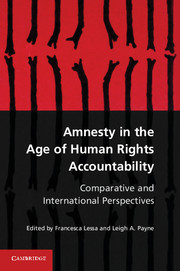Book contents
- Frontmatter
- Contents
- Contributors
- Foreword
- Acknowledgments
- Introduction
- Part I Theoretical Framework
- Part II Comparative Case Studies
- 3 Amnesties’ Challenge to the Global Accountability Norm?
- 4 From Amnesty to Accountability
- 5 Barriers to Justice
- 6 Resistance to Change
- 7 De Facto and De Jure Amnesty Laws
- 8 Creeks of Justice
- 9 Accountability through Conditional Amnesty
- 10 De Facto Amnesty?
- 11 A Limited Amnesty?
- 12 The Spanish Amnesty Law of 1977 in Comparative Perspective
- Conclusion Amnesty in the Age of Accountability
- Bibliography
- Index
- References
6 - Resistance to Change
Brazil’s Persistent Amnesty and its Alternatives for Truth and Justice
Published online by Cambridge University Press: 05 June 2012
- Frontmatter
- Contents
- Contributors
- Foreword
- Acknowledgments
- Introduction
- Part I Theoretical Framework
- Part II Comparative Case Studies
- 3 Amnesties’ Challenge to the Global Accountability Norm?
- 4 From Amnesty to Accountability
- 5 Barriers to Justice
- 6 Resistance to Change
- 7 De Facto and De Jure Amnesty Laws
- 8 Creeks of Justice
- 9 Accountability through Conditional Amnesty
- 10 De Facto Amnesty?
- 11 A Limited Amnesty?
- 12 The Spanish Amnesty Law of 1977 in Comparative Perspective
- Conclusion Amnesty in the Age of Accountability
- Bibliography
- Index
- References
Summary
This chapter aims to analyze transitional justice in Brazil, particularly the developments in the fields of reparation and memory and the reasons behind the persistence of the 1979 amnesty law for perpetrators of grave human rights violations. In order to do so, the chapter is divided into three parts. It begins by analyzing the development of four main dimensions of transitional justice in Brazil, namely reparations, truth and memory processes, institutional reform, and the regularization of justice and reestablishment of equality before the law. It argues that the policy of reparations to victims is the lynchpin of the Brazilian transitional justice agenda, a mechanism that has fostered progress in the recovery of truth and memory, and more recently, in the pursuit of justice. Second, the chapter analyzes the political and judicial reasons behind the effectiveness of the 1979 amnesty law. Finally, it concludes by examining the ongoing pursuit of truth in Brazil as well as justice alternatives for addressing human rights violations.
The main argument is that Brazil has had an ambiguous amnesty process. The reparations policies adopted under the current democratic regimes emerged from a concept of “amnesty as freedom and reparations” substantially different from the concept of “amnesty as oblivion and impunity” imposed by the regime in 1979. In this sense, the reparations process has the potential to craft a democratic concept of amnesty. The reparatory policies contained in the 1988 constitution and developed during the governments of Fernando Henrique Cardoso and Luis Inácio Lula da Silva were carried out in a way that challenged the idea of a bilateral amnesty. The reparatory process connects amnesty and reparation, focusing on the politically persecuted and excluding the perpetrators. In this sense, progress with the policy of reparations legitimized amnesty for the victims and delegitimized amnesty for perpetrators. This allowed for the development of other transitional justice dimensions that would otherwise be blocked by the idea of “amnesty as impunity and oblivion.” Therefore the reparations process opened up a national dialogue through which greater accountability might be possible in the future. This process involved an internal challenge to the culture of impunity in Brazil.
- Type
- Chapter
- Information
- Amnesty in the Age of Human Rights AccountabilityComparative and International Perspectives, pp. 152 - 181Publisher: Cambridge University PressPrint publication year: 2012
References
- 6
- Cited by



